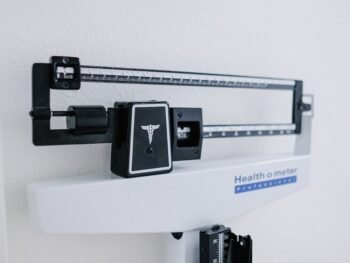Diet plays a crucial role in our overall health and well-being. The food we consume provides the necessary nutrients for our bodies to function properly and maintain optimal health. A balanced diet that is rich in essential nutrients is essential for maintaining a healthy weight, preventing chronic diseases, and promoting overall well-being.
Maintaining a healthy weight is one of the key benefits of diet control. When we consume more calories than our bodies need, the excess energy is stored as fat, leading to weight gain. On the other hand, when we consume fewer calories than our bodies need, we create a calorie deficit, which leads to weight loss. By controlling our diet and ensuring that we consume the right amount of calories for our individual needs, we can achieve and maintain a healthy weight.
In addition to weight management, diet control is also crucial for preventing chronic diseases such as heart disease, diabetes, and certain types of cancer. A diet high in saturated fats, trans fats, cholesterol, and sodium can increase the risk of developing these diseases. On the other hand, a diet rich in fruits, vegetables, whole grains, lean proteins, and healthy fats can help reduce the risk of chronic diseases and promote overall health.
Key Takeaways
- Diet control is crucial for optimal health.
- Macronutrients and micronutrients are essential components of a healthy diet.
- Balancing energy intake and expenditure is key to effective calorie control.
- Portion control and mindful eating are effective strategies for managing food intake.
- Meal planning, smart snacking, and making healthy choices when dining out are important for maintaining a healthy diet long-term.
Understanding the Basics of Nutrition: Macronutrients and Micronutrients
To understand the importance of diet control, it is essential to understand the basics of nutrition. Nutrition is the science that studies how food nourishes our bodies and provides us with the necessary nutrients for growth, development, and maintenance.
Macronutrients are nutrients that our bodies require in large amounts to provide energy and support various bodily functions. The three main macronutrients are carbohydrates, proteins, and fats. Carbohydrates are the body's primary source of energy and can be found in foods such as grains, fruits, vegetables, and legumes. Proteins are essential for building and repairing tissues and can be found in foods such as meat, poultry, fish, dairy products, and legumes. Fats are a concentrated source of energy and are necessary for the absorption of fat-soluble vitamins. They can be found in foods such as oils, nuts, seeds, and fatty fish.
Micronutrients, on the other hand, are nutrients that our bodies require in smaller amounts but are still essential for proper functioning. Micronutrients include vitamins and minerals. Vitamins are organic compounds that our bodies need in small amounts to support various bodily functions. They can be found in foods such as fruits, vegetables, whole grains, and dairy products. Minerals are inorganic compounds that our bodies need in small amounts for various functions such as bone health, nerve function, and fluid balance. They can be found in foods such as fruits, vegetables, whole grains, dairy products, and meats.
The Role of Calories in Diet Control: Balancing Energy Intake and Expenditure
Calories are units of energy that our bodies obtain from the food we consume. The concept of energy balance is crucial for diet control. Energy balance refers to the balance between the calories we consume through food and the calories we expend through physical activity and bodily functions.
To maintain a healthy weight, it is important to create a calorie deficit by consuming fewer calories than we expend. This can be achieved by tracking our calorie intake and expenditure. There are various tools and apps available that can help us track our calorie intake and expenditure accurately.
Creating a calorie deficit for weight loss can be achieved by reducing calorie intake through portion control and making healthier food choices. It is important to focus on nutrient-dense foods that provide essential nutrients while being lower in calories. This includes foods such as fruits, vegetables, whole grains, lean proteins, and healthy fats.
Strategies for Effective Portion Control: Tips and Tricks for Managing Food Intake
| Strategy | Description |
|---|---|
| Use smaller plates | Using smaller plates can help you eat smaller portions without feeling deprived. |
| Measure your food | Measuring your food can help you keep track of your portions and avoid overeating. |
| Eat slowly | Eating slowly can help you feel full faster and prevent overeating. |
| Drink water before meals | Drinking water before meals can help you feel full and eat less. |
| Avoid distractions | Avoiding distractions like TV or your phone can help you focus on your food and prevent overeating. |
| Plan your meals | Planning your meals can help you control your portions and avoid impulsive eating. |
| Choose high-fiber foods | Choosing high-fiber foods can help you feel full and satisfied with smaller portions. |
| Practice mindful eating | Practicing mindful eating can help you pay attention to your body's hunger and fullness signals and prevent overeating. |
Portion control is an essential aspect of diet control and weight management. It involves managing the amount of food we consume to ensure that we are not overeating. By controlling portion sizes, we can reduce calorie intake and maintain a healthy weight.
One practical tip for controlling portion sizes is to use smaller plates and bowls. Research has shown that using smaller plates and bowls can trick our minds into thinking that we are consuming a larger portion, leading to reduced calorie intake. Additionally, it is important to be mindful of serving sizes and read food labels to understand the recommended portion sizes.
Another strategy for effective portion control is to divide meals into smaller portions and eat slowly. By eating smaller portions, we can satisfy our hunger while consuming fewer calories. Eating slowly allows our bodies to recognize when we are full, preventing overeating.
Mindful Eating: Techniques for Being Present and Enjoying Your Food
Mindful eating is a practice that involves being present and fully engaged in the act of eating. It involves paying attention to the taste, texture, and smell of food, as well as the sensations in our bodies while eating.
One of the benefits of mindful eating is that it helps us recognize our body's hunger and fullness cues. By being present while eating, we can better understand when we are truly hungry and when we are satisfied. This can prevent overeating and promote a healthier relationship with food.
To practice mindful eating, it is important to eliminate distractions such as television or smartphones while eating. Instead, focus on the food in front of you and take the time to savor each bite. Chew slowly and pay attention to the flavors and textures of the food. This can help us feel more satisfied with smaller portions and prevent mindless snacking.
The Benefits of Meal Planning: How to Plan and Prepare Healthy Meals in Advance

Meal planning is a valuable tool for diet control and maintaining a healthy diet. It involves planning and preparing meals in advance, which can help save time, money, and ensure that we have healthy options readily available.
One of the benefits of meal planning is that it allows us to have more control over our food choices. By planning meals in advance, we can ensure that we are including a variety of nutrient-dense foods in our diet. This can help us meet our nutritional needs and prevent nutrient deficiencies.
To start meal planning, it is important to set aside time each week to plan meals and create a shopping list. When planning meals, consider including a variety of fruits, vegetables, whole grains, lean proteins, and healthy fats. It can also be helpful to prepare meals in bulk and portion them out for the week. This can save time and make it easier to stick to a healthy eating plan.
Smart Snacking: Choosing Nutritious and Satisfying Snacks
Snacking can be a part of a healthy diet when done right. Smart snacking involves choosing nutritious and satisfying snacks that provide essential nutrients while being lower in calories.
When choosing snacks, it is important to focus on nutrient-dense options that provide vitamins, minerals, and fiber. Examples of nutritious snacks include fruits, vegetables with hummus or yogurt dip, nuts and seeds, whole grain crackers with cheese or nut butter, and Greek yogurt.
It is also important to practice portion control when snacking. Instead of eating directly from the package, portion out snacks into smaller containers or bags. This can help prevent mindless eating and ensure that we are consuming an appropriate amount of calories.
Navigating Dining Out: Making Healthy Choices When Eating at Restaurants
Eating out can present challenges when it comes to maintaining a healthy diet. However, with some strategies and mindful choices, it is possible to make healthier choices when dining out.
One tip for making healthier choices when eating out is to review the menu in advance. Many restaurants now provide nutritional information for their menu items, which can help us make informed choices. Look for options that are lower in calories, saturated fats, and sodium. Choose dishes that are grilled, baked, or steamed instead of fried.
Another strategy is to practice portion control when dining out. Many restaurants serve large portions, which can lead to overeating. Consider sharing a meal with a friend or asking for a to-go box at the beginning of the meal and portioning out half of the meal to take home.
Special Considerations: Diet Control for Individuals with Specific Health Conditions
For individuals with specific health conditions such as diabetes or high blood pressure, diet control is even more crucial. These conditions often require dietary modifications to manage symptoms and prevent complications.
For individuals with diabetes, it is important to monitor carbohydrate intake and choose foods that have a lower glycemic index. This includes foods such as whole grains, fruits, vegetables, lean proteins, and healthy fats. It is also important to spread carbohydrate intake throughout the day and monitor portion sizes.
For individuals with high blood pressure, it is important to reduce sodium intake and choose foods that are lower in sodium. This includes avoiding processed foods, canned soups, and fast food. Instead, focus on fresh fruits and vegetables, lean proteins, whole grains, and low-fat dairy products.
Staying Motivated: Tips for Maintaining a Healthy Diet and Lifestyle Long-Term
Staying motivated is essential for maintaining a healthy diet and lifestyle long-term. It can be challenging to stick to a healthy eating plan, especially when faced with temptations or setbacks. However, with some strategies and support, it is possible to stay motivated and achieve long-term success.
One tip for staying motivated is to set realistic goals. Instead of aiming for drastic changes overnight, focus on making small, sustainable changes over time. Celebrate each small success along the way, such as reaching a milestone or sticking to a healthy eating plan for a certain period of time.
Tracking progress can also be a helpful tool for staying motivated. Keep a food diary or use a tracking app to monitor food intake and physical activity. This can help identify patterns, track progress, and provide accountability.
Finding a support system is also important for staying motivated. Surround yourself with like-minded individuals who have similar goals and can provide support and encouragement. This can be friends, family members, or joining a support group or online community.
In conclusion, diet control is essential for optimal health and well-being. By understanding the basics of nutrition, balancing energy intake and expenditure, practicing portion control, mindful eating, meal planning, smart snacking, making healthy choices when dining out, and considering specific health conditions, we can maintain a healthy diet and lifestyle long-term. Staying motivated and celebrating successes along the way is crucial for achieving long-term success.
Check out this article on the blog: "The Benefits of Practicing Asian Martial Arts for Mind, Body, and Spirit." It explores how martial arts can have a positive impact on various aspects of your life. From improving physical fitness to enhancing mental focus and discipline, Asian martial arts offer a holistic approach to personal development. Discover the rich history and philosophy behind these ancient practices and learn how they can benefit you. Read more
FAQs
What is diet control?
Diet control refers to the practice of regulating one's food intake in order to achieve a specific health goal, such as weight loss or management of a medical condition.
Why is diet control important?
Diet control is important because it can help individuals maintain a healthy weight, reduce the risk of chronic diseases such as diabetes and heart disease, and improve overall health and well-being.
What are some common strategies for diet control?
Common strategies for diet control include tracking food intake, reducing portion sizes, choosing nutrient-dense foods, limiting processed and high-fat foods, and increasing physical activity.
What are some potential benefits of diet control?
Potential benefits of diet control include weight loss, improved blood sugar control, reduced risk of chronic diseases, improved energy levels, and improved overall health and well-being.
Are there any potential risks or drawbacks to diet control?
Potential risks or drawbacks of diet control include nutrient deficiencies if not done properly, feelings of deprivation or restriction, and the potential for disordered eating behaviors if taken to an extreme. It is important to consult with a healthcare professional before making significant changes to one's diet.





